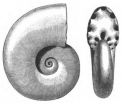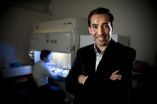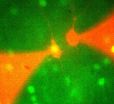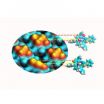(Press-News.org) PROVIDENCE, R.I. [Brown University] — The world's oceans are under siege. Conservation biologists regularly note the precipitous decline of key species, such as cod, bluefin tuna, swordfish and sharks. Lose enough of these top-line predators (among other species), and the fear is that the oceanic web of life may collapse.
In a new paper in Geology, researchers at Brown University and the University of Washington used a group of marine creatures similar to today's nautilus to examine the collapse of marine ecosystems that coincided with two of the greatest mass extinctions in the Earth's history. They attribute the ecosystems' collapse to a loss of enough species occupying the same space in the oceans, called "ecological redundancy."
While the term is not new, the paper marks the first time that a loss of ecological redundancy is directly blamed for a marine ecosystem's collapse in the fossil record. Just as ominously, the authors write that it took up to 10 million years after the mass extinctions for enough variety of species to repopulate the ocean – restoring ecological redundancy – for the ecosystem to stabilize.
"It's definitely a cautionary tale because we know it's happened at least twice before," said Jessica Whiteside, assistant professor of geological sciences at Brown and the paper's lead author. "And you have long periods of time before you have reestablishment of ecological redundancy."
If the theory is true, the implications could not be clearer today. According to the United Nations-sponsored report Global Biodiversity Outlook 2, the population of nearly one-third of marine species that were tracked had declined over the three decades that ended in 2000. The numbers were the same for land-based species. "In effect, we are currently responsible for the sixth major extinction event in the history of the Earth, and the greatest since the dinosaurs disappeared, 65 million years ago," the 2006 report states.
Whiteside and co-author Peter Ward studied mass extinctions that ended the Permian period 250 million years ago and another that brought the Triassic to a close roughly 200 million years ago. Both periods are generally believed to have ended with global spasms of volcanic activity. The abrupt change in climate stemming from the volcanism, notably a spike in greenhouse gases in the atmosphere, decimated species on land and in the oceans, losing approximately 90 percent of existing marine species in the Permian-Triassic and 72 percent in the Triassic-Jurassic. The widespread loss of marine life and the abrupt change in global climate caused the carbon cycle, a broad indicator of life and death and outside influences in the oceans, to fluctuate wildly. The authors noted these "chaotic carbon episodes" and their effects on biodiversity by studying carbon isotopes spanning these periods.
The researchers further documented species collapse in the oceans by compiling a 50-million-year fossil record of ammonoids, predatory squidlike creatures that lived inside coiled shells, found embedded in rocks throughout western Canada. The pair found that two general types of ammonoids, those that could swim around and pursue prey and those that simply floated throughout the ocean, suffered major losses. The fossil record after the end-Permian and end-Triassic mass extinctions shows a glaring absence of swimming ammonoids, which, because they compete with other active predators including fish, is interpreted as a loss of ecological redundancy.
"It means that during these low-diversity times, there are only one or two (ammonoids) taxa that are performing. It's a much more simplified food chain," Whiteside noted.
Only when the swimming ammonoids reappear alongside its floating brethren does the carbon isotope record stabilize and the ocean ecosystem fully recover, the authors report. "That's when we say ecological redundancy is reestablished," Whiteside said. "The swimming ammonoids have fulfilled that trophic role."
INFORMATION:
The U.S. National Science Foundation and the NASA Astrobiology Institute funded the research.
Species loss tied to ecosystem collapse and recovery
2011-01-11
ELSE PRESS RELEASES FROM THIS DATE:
Early investigations promising for detecting metastatic breast cancer cells
2011-01-11
Research by engineers and cancer biologists at Virginia Tech indicate that using specific silicon microdevices might provide a new way to screen breast cancer cells' ability to metastasize.
An image of their work provided to Biomaterials was selected as one of the 12 best biomaterials-related images published in the journal's 2010 catalogue. http://www.elsevierscitech.com/pdfs/Biomaterials_2010.pdf
The Virginia Tech researchers are: Masoud Agah, director of Virginia Tech's Microelectromechanical Systems Laboratory (MEMS) Laboratory in the Bradley Department of Electrical ...
Research identifies drug target for prion diseases, 'mad cow'
2011-01-11
LEXINGTON, Ky. (Jan. 4, 2011) − Scientists at the University of Kentucky have discovered that plasminogen, a protein used by the body to break up blood clots, speeds up the progress of prion diseases such as mad cow disease.
This finding makes plasminogen a promising new target for the development of drugs to treat prion diseases in humans and animals, says study senior author Chongsuk Ryou, a researcher at the UK Sanders-Brown Center on Aging and professor of microbiology, immunology and molecular genetics in the UK College of Medicine.
"I hope that our study ...
Earth: Finding new oil and gas frontiers
2011-01-11
Alexandria, VA – Where to next in the search for oil and gas? EARTH examines several possible new frontiers - including the Arctic, the Falkland Islands, the Levant, Trinidad and Tobago and Sudan - where oil and gas exploration are starting to take hold. One of those places, Sudan, is in the news for other reasons: South Sudan voted yesterday on whether to secede from North Sudan.
But given that South Sudan holds more than 70 percent of Sudan's 5 billion to 6 billion barrels of proven reserves, a lot in this election hinges on oil. If South Sudan does secede, how will ...
Carnegie Mellon researchers identify 'Facebook neurons'
2011-01-11
PITTSBURGH—Carnegie Mellon University researchers have found that within the brain's neocortex lies a subnetwork of highly active neurons that behave much like people in social networks. Like Facebook, these neuronal networks have a small population of highly active members who give and receive more information than the majority of other members, says Alison Barth, associate professor of biological sciences at Carnegie Mellon and a member of the Center for the Neural Basis of Cognition (CNBC). By identifying these neurons, scientists will now be able to study them further ...
Study: Outsourcing hurts consumers by softening competition among firms
2011-01-11
CHAMPAIGN, Ill. – Firms that outsource aspects of their business to a foreign country may profit by saving money, but the practice tends to soften the competition among industry rivals, exacting a hidden cost on consumers, says new research co-written by a University of Illinois business administration professor.
Yunchuan "Frank" Liu says outsourcing hurts society in two ways – it results in lost jobs for workers, and in consumers paying higher prices than they should for goods.
"Outsourcing is a topic that affects just about everyone, and the general consensus is that ...
Direct observation of carbon monoxide binding to metal-porphyrines
2011-01-11
The mechanism for binding oxygen to metalloporphyrins is a vital process for oxygen-breathing organisms. Understanding how small gas molecules are chemically bound to the metal complex is also important in catalysis or the implementation of chemical sensors. When investigating these binding mechanisms, scientists use porphyrin rings with a central cobalt or iron atom. They coat a copper or silver support surface with these substances.
An important characteristic of porphyrins is their conformational flexibility. Recent research has shown that each specific geometric configuration ...
Study finds nearly half of school social workers feel unequipped to handle cyberbullying
2011-01-11
Instances of cyber bullying continue to make news nearly every day, and while it's recognized as a problem among most school-aged children, a new study published this month in Children & Schools and coauthored by Temple University social work professor Jonathan Singer finds that nearly half of school social workers feel they are ill equipped to handle it.
"School social workers provide more crisis intervention services than any other school staff member – more than counselors, nurses, teachers, or psychologists," said Singer. "As a result, school social workers are a ...
'Liquid pistons' could drive new advances in camera lenses and drug delivery
2011-01-11
VIDEO:
Researchers at Rensselaer Polytechnic Institute have developed liquid pistons, which can be used to precisely pump small volumes of liquid. Comprising the pistons are droplets of nanoparticle-infused ferrofluids, which can...
Click here for more information.
Troy, N.Y. – A few unassuming drops of liquid locked in a very precise game of "follow the leader" could one day be found in mobile phone cameras, medical imaging equipment, implantable drug delivery devices, ...
Embryonic stem cells help deliver 'good genes' in a model of inherited blood disorder
2011-01-11
Researchers at Nationwide Children's Hospital report a gene therapy strategy that improves the condition of a mouse model of an inherited blood disorder, Beta Thalassemia. The gene correction involves using unfertilized eggs from afflicted mice to produce a batch of embryonic stem cell lines. Some of these stem cell lines do not inherit the disease gene and can thus be used for transplantation-based treatments of the same mice. Findings could hold promise for a new treatment strategy for autosomal dominant diseases like certain forms of Beta Thalassemia, tuberous sclerosis ...
An earlier start on diagnosing breast, prostate cancers
2011-01-11
Using biological samples taken from patients and state-of-the-art biochemical techniques, a Florida State University researcher is working to identify a variety of "biomarkers" that might provide earlier warnings of the presence of breast and prostate cancers.
"Biomarkers are indicators of certain biological and pathological processes that are occurring, such as cancer," said Qing-Xiang "Amy" Sang, a professor in Florida State's Department of Chemistry and Biochemistry. "Either the cancer cells themselves, or surrounding normal tissue for that matter, can produce specific ...






